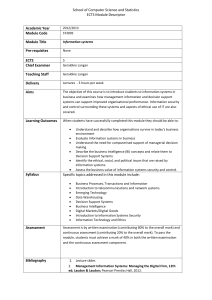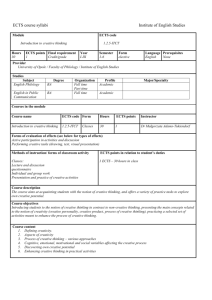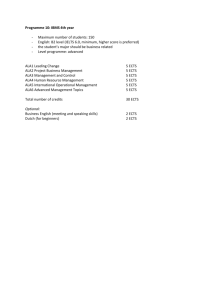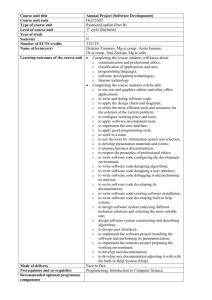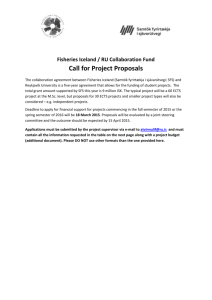Module description
advertisement
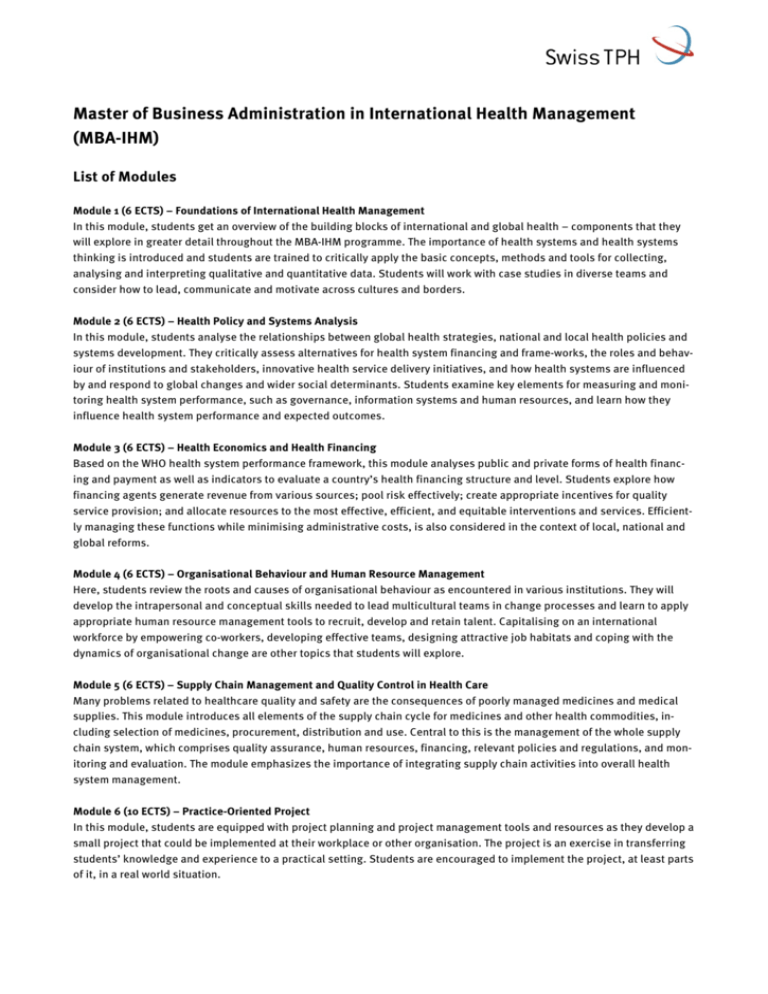
Master of Business Administration in International Health Management (MBA-IHM) List of Modules Module 1 (6 ECTS) – Foundations of International Health Management In this module, students get an overview of the building blocks of international and global health – components that they will explore in greater detail throughout the MBA-IHM programme. The importance of health systems and health systems thinking is introduced and students are trained to critically apply the basic concepts, methods and tools for collecting, analysing and interpreting qualitative and quantitative data. Students will work with case studies in diverse teams and consider how to lead, communicate and motivate across cultures and borders. Module 2 (6 ECTS) – Health Policy and Systems Analysis In this module, students analyse the relationships between global health strategies, national and local health policies and systems development. They critically assess alternatives for health system financing and frame-works, the roles and behaviour of institutions and stakeholders, innovative health service delivery initiatives, and how health systems are influenced by and respond to global changes and wider social determinants. Students examine key elements for measuring and monitoring health system performance, such as governance, information systems and human resources, and learn how they influence health system performance and expected outcomes. Module 3 (6 ECTS) – Health Economics and Health Financing Based on the WHO health system performance framework, this module analyses public and private forms of health financing and payment as well as indicators to evaluate a country’s health financing structure and level. Students explore how financing agents generate revenue from various sources; pool risk effectively; create appropriate incentives for quality service provision; and allocate resources to the most effective, efficient, and equitable interventions and services. Efficiently managing these functions while minimising administrative costs, is also considered in the context of local, national and global reforms. Module 4 (6 ECTS) – Organisational Behaviour and Human Resource Management Here, students review the roots and causes of organisational behaviour as encountered in various institutions. They will develop the intrapersonal and conceptual skills needed to lead multicultural teams in change processes and learn to apply appropriate human resource management tools to recruit, develop and retain talent. Capitalising on an international workforce by empowering co-workers, developing effective teams, designing attractive job habitats and coping with the dynamics of organisational change are other topics that students will explore. Module 5 (6 ECTS) – Supply Chain Management and Quality Control in Health Care Many problems related to healthcare quality and safety are the consequences of poorly managed medicines and medical supplies. This module introduces all elements of the supply chain cycle for medicines and other health commodities, including selection of medicines, procurement, distribution and use. Central to this is the management of the whole supply chain system, which comprises quality assurance, human resources, financing, relevant policies and regulations, and monitoring and evaluation. The module emphasizes the importance of integrating supply chain activities into overall health system management. Module 6 (10 ECTS) – Practice-Oriented Project In this module, students are equipped with project planning and project management tools and resources as they develop a small project that could be implemented at their workplace or other organisation. The project is an exercise in transferring students’ knowledge and experience to a practical setting. Students are encouraged to implement the project, at least parts of it, in a real world situation. Module 7 (6 ECTS) – Social Marketing and Communication Health professionals and administrators struggle daily with the need to persuade various segments of the population or key-decision makers to adopt behaviours, actions or policies in support of a particular health initiative. Merely disseminating information is often not enough to convince people to take action. The module introduces students to social and behavioural change principles, as well as social marketing approaches, planning steps and evaluation. Ethical issues, market/audience analysis and contextual considerations, including competition, will be introduced. Some aspects of health and media communications will also be discussed. Module 8 (6 ECTS) – Economic Evaluation for Health Planning In health care decision making, economic evaluation is used to varying degrees in different countries and for different purposes, depending on the country’s dominant health system. In this module, students will learn how to appraise possible health interventions using economic evaluation tools and techniques to ensure cost-effectiveness, without losing sight of the demands and needs of populations. Module 9 (6 ECTS) – Financial Budgeting, Accounting and Reporting In most organisations, financial management skills tend to be concentrated in a small core of financial experts. In many small organizations and in the public sector, employees are given responsibilities in financial management for which they have not been trained. This module addresses the basics of the financial cycle from budgeting, implementing and recording, through to financial reporting. Students will get an in-depth look at the workings of bookkeeping, reporting, internal controlling, financial management of physical assets and stocks, and auditing. They will also learn to extract and use relevant information from the financial management system to make key decisions. Module 10 (6 ECTS) – Leadership Leadership ought to set a good example, innovate and inspire, imbue the organisation with the desire to perform at a high level, on the one hand, and to safeguard core values, on the other. In this module, students gain insight into the leadership behaviour of others and of themselves and discuss what it takes to be considered the designer of an organisation or an organisational unit that others want to be part of. The module covers all topics linked to the challenge of combining the economic imperative for a competitive, highly productive work force with trust, empowerment and respect for the individual. Module 11 (6 ECTS) – Strategic Planning for Health Intervention In this module, students use case studies and decision-analytic modelling approaches to design a health programme: conducting a situation analysis and setting priorities for interventions that are consistent with existing national health policies in resource constrained countries. It covers salient topics such as analysing the problem, developing log frames, setting indicators and monitoring and evaluation. Module 12 (20 ECTS) – Thesis Preparation and Master Thesis The Master thesis allows the student to demonstrate competence in managing research- or project-based work in conjunction with professional practice and ethical principles. Students will be evaluated on their ability to: identify and critically evaluate concepts, models and principles suited to the chosen area of work; select and justify a methodology that applies the most appropriate tools, techniques and practices; and engage in reflective and reflexive analysis of the findings or processes. Course Schedule Please visit our website at www.swisstph.ch/mba-ihm.html for the most up-to-date course timetable. Programme Costs – Tuition Fees 2015 Module 1 – 5, 7 – 11: Module 6: Module 12: CHF 2,200 per module + CHF 250 per end-of-module exam CHF 3,000 CHF 4,000 Prospective students should also factor in costs related to: travel to and from Basel; accommodation, food and transportation in Basel during on-campus periods; related insurances.


